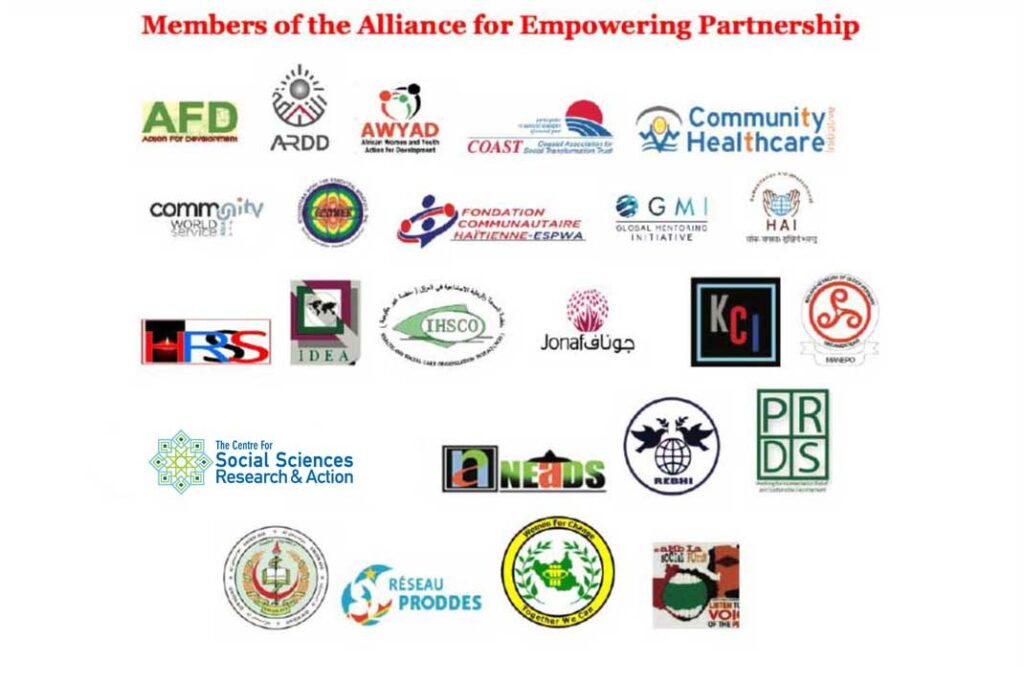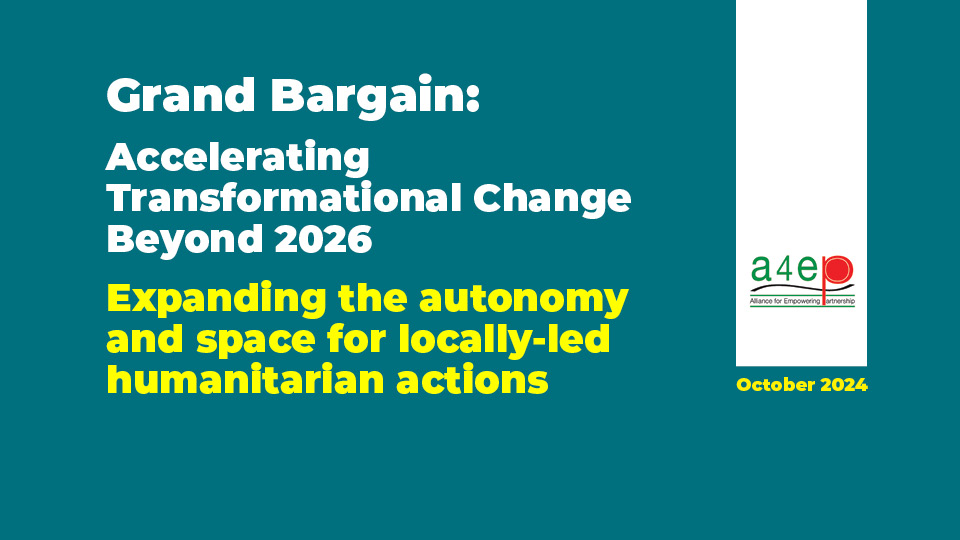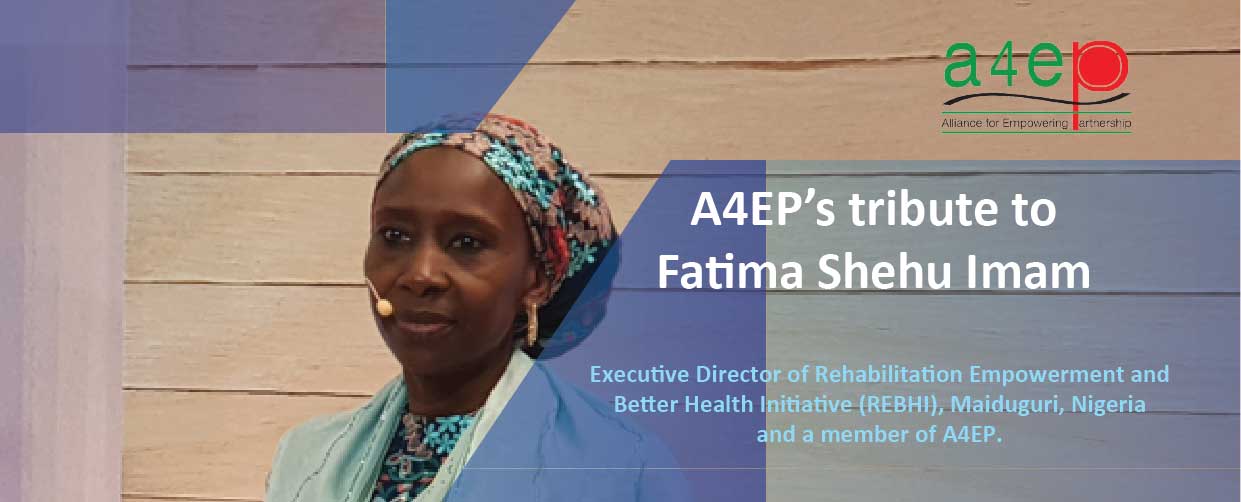The world has dramatically changed since the inception of the Grand Bargain in 2016. In light of the current needs of affected populations and the announced cuts in donor budgets it is vital to accelerate the implementation of the GB localisation commitments and expand the space for locally led humanitarian actions. As we approach the 10th anniversary of the Grand Bargain in 2026, the Alliance for Empowering Partnership (A4EP) calls for a bolder shift towards more transformative and actionable changes. Empowered local humanitarian actors and communities and are key to more effective and accountable humanitarian response, it is now a critical moment for the humanitarian community to expand the space and resources for local actors and recognize the capacity as well of the affected people, ensuring that they are at the heart of global and national decision-making processes.
Since becoming a signatory to the Grand Bargain in 2020, A4EP has consistently championed localisation, equitable partnerships, accountability to affected population and the inclusion of diverse local actors in global humanitarian governance. We echo the urgency voiced in our previous paper, “Grand Bargain Beyond 2023 — Shifting from Paper to Practice,“ where we emphasized the need for practical steps toward implementing the commitments already made. The Grand Bargain must now deliver real, sustained progress beyond 2026, focusing on strengthening local leadership and addressing power inequity, systemic gaps in funding, representation and decision-making.
Results from A4EP’s 2023 Survey: Closing the Gaps in Localisation
A4EP’s survey on the implementation of Grand Bargain 3.0, which gathered responses from 77 local and national actors across 14 countries in the Global South, provides critical insights into the challenges facing local organisations in humanitarian settings. The findings demonstrate that, while there has been policy progress, the realities on the ground remain starkly different:
● Funding Gaps: 36% of respondents received no humanitarian funding in 2023. Of those who did receive funding, 43% did not have access to multi-year funding, and only 28% received flexible funds. These gaps highlight that funding mechanisms are still not meeting the needs of local actors, limiting their ability to lead responses in their own communities.
● Inequitable Partnerships: More than half of respondents (51%) reported that their partnerships with international actors were not based on equitable agreements. Many described their roles as subcontractors rather than true partners. This reflects the need for more genuine collaboration and power-sharing between international and local actors.
● Limited Participation: Only 43% of local actors participated in humanitarian coordination mechanisms, and many felt their participation was more ceremonial than meaningful. Local actors continue to be sidelined in decision-making processes, despite their proximity to crises and their critical role in response efforts.
These findings reinforce A4EP’s previous calls for urgent action to bridge the gap between global commitments and local realities. In line with the recommendations from our survey report: “Closing the Gap: Strengthening Localisation”, it is clear that without concrete, systematic changes, the goals of the Grand Bargain will remain unfulfilled.
Policy Shifts: Encouraging but Insufficient
A4EP acknowledges the positive steps taken by some donor signatories such as USAID’s Locally Led Humanitarian Assistance Policy that outlines a clear commitment to placing local communities at the center of humanitarian response, early recovery, and resilience efforts. Similarly, DG ECHO’s Equitable Partnerships Policy demonstrates a move towards more inclusive and equitable localisation practices. These policies are critical milestones in the Grand Bargain process, showing a clear shift toward inclusive and equitable localisation practices
However, while these policies are encouraging, they are not enough on their own. Systematic implementation and tangible support at the local level remain lacking. A key challenge, as highlighted by the Humanitarian Advisory Group (HAG) research: Bridging the Intention to Action Gap: The Future Role of Intermediaries in Supporting Locally Led Humanitarian Action, is the role of intermediaries. International organisations often default to direct implementation, sidelining local actors and contradicting localisation goals. Even when intermediaries are involved, many local actors do not receive the necessary support to lead effectively.
A4EP acknowledges the steps taken by intermediary agencies towards fostering more equitable partnerships. However, these actions remain ad hoc and lack institutionalisation, preventing consistent and sustained progress in empowering local actors.
A4EP calls for donor and intermediaries commitments to be translated into concrete actions that lead to measurable improvements for local and national actors. The current policy changes should be fully operationalized, and their impact on local actors must be continuously monitored and evaluated.
The Call for Action: Turning Commitments into Reality
To ensure that the Grand Bargain achieves its goals by 2026 and beyond, A4EP calls for accelerated efforts to implement the commitments made, particularly in the areas of funding, partnerships, and participation:
- Autonomy and freedom to design the response with affected populations that meets their needs: Affected communities often express dissatisfaction with humanitarian responses, desiring greater involvement in decisions that impact their lives. Granting local actors more autonomy and freedom to design and implement responses in collaboration with affected populations will increase the effectiveness, dignity, and accountability of humanitarian efforts, while ensuring responses are better aligned with local needs.
- Direct, Multi-Year, and Flexible Funding: A4EP’s survey highlights the persistent struggle of local actors to access the resources necessary to lead responses effectively. Donors must fulfil the Grand Bargain commitment of directing at least 25% of humanitarian funding to local actors. This funding must be multi-year, flexible, and predictable allowing local organisations to plan and respond to crises over the long term.
- Equitable and Genuine Partnerships: The Grand Bargain signatories must ensure that international actors move beyond subcontracting relationships and create equitable partnerships where local actors have decision-making power in designing and implementing humanitarian actions. Local organisations should be true partners, not merely implementers of externally-driven projects.
- Meaningful Participation in Decision-Making: Local actors need more than a seat at the table—they need meaningful roles in humanitarian coordination bodies and decision-making processes. The international community must prioritise local voices and perspectives, ensuring that their participation goes beyond tokenism and directly influences policy and strategy.
- Systematic Policy Implementation and Data Transparency: Policies like those from USAID and DG ECHO must be fully implemented at the ground level, with their effectiveness evaluated based on local actors’ experiences. Additionally, donors and intermediaries must uphold their commitment to channel 25% of funding directly to local actors, enhancing data transparency and public reporting to ensure monitoring and accountability in advancing localisation efforts.
Looking Ahead: Building a Locally-Led Humanitarian System Beyond 2026
A4EP envisions the Grand Bargain beyond 2026 as a framework where local actors are fully empowered with the space, resources and collaborative partnerships needed to lead humanitarian actions. Achieving this requires the humanitarian system to embrace localisation as more than just a financial or procedural shift —it must represent a fundamental rethinking of power dynamics and promote solidarity. As highlighted in the Humanitarian Aid International (HAI) paper, “Localisation: An Unfinished Agenda Beyond 2026,“ the future of the Grand Bargain must tackle the colonial legacy embedded in humanitarian structures. This involves creating a system where local actors have autonomy and control over resources, knowledge production, and decision-making. A clear strategy with measurable indicators is essential to hold all parties accountable and track progress toward desired goals.
A4EP also commits to continuing its advocacy for locally-led approaches through documenting and sharing best practices. We will collaborate with donors, international and national intermediaries including UN Agencies and international NGOs, and networks to push for transparency and accountability in implementing Grand Bargain commitments, especially at the national level.
Together, we can create a more inclusive, equitable, and effective humanitarian system—one where local communities are not just beneficiaries, but leaders in their own recovery and resilience.
Let us turn the Grand Bargain into a Grand Reality for all.
Twitter: @A4EP2
For more information, you may contact: Email: [email protected]





